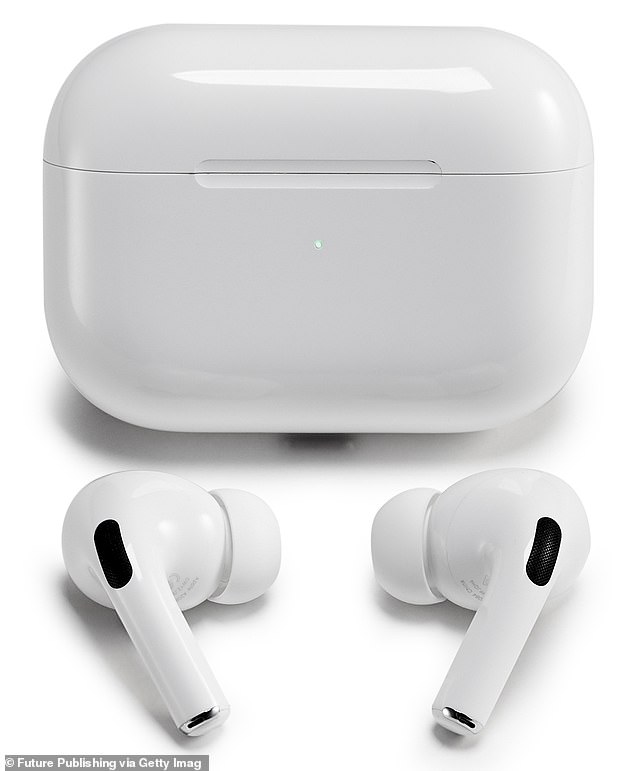Apple is facing a lawsuit for ‘false advertising’ for a popular device
Apple is facing a class action lawsuit claiming the tech giant falsely advertised a popular device.
Three plaintiffs alleged that Apple spent three years declaring the $250 AirPods Pro Gen 1 were “premium” earbuds after admitting that some of the devices were defective.
Customers said they reported the issues in 2019 due to major sound issues such as crackling, static, background interruption and loss of sound.
The lawsuit states that “Apple touted the superior audio and noise cancellation qualities of its AirPods Pro Gen 1 and sold AirPods Pro Gen 1 to consumers nationwide even though the AirPods Pro Gen 1 had an audio defect.”
Apple acknowledged the sound issues a year after the product’s release in 2020 and told consumers it would repair or replace affected AirPods Pro at no charge.
But plaintiffs allege that Apple hid its acknowledgment of the problem on its support page and never took steps to notify people who had purchased the device.
They are suing for violating the consumer protection and warranty laws of California, Ohio, Pennsylvania and Texas and seeking damages, fees, costs and a jury trial.
Apple is facing a class action lawsuit from consumers who claim the company falsely advertised its Airpods Pro Gen 1 headphones despite knowing they were defective

The lawsuit included photos of the defective devices sold 15 months apart. The defective earbud mesh sample (pictured left) was sold before the recall in 2019, while the sample on the right (pictured) was sold in 2021
Lawyers for TYCKO & ZAVAREEI, who are defending the plaintiffs, told DailyMail.com: ‘The precise amount Apple received from other consumers who were defrauded by overpaying for a product that Apple knew was defective will be determined as the lawsuit progresses.
“Given that Apple has sold an estimated $12.1 billion worth of AirPods (all models) and has the largest share of the wireless headset market, we expect consumers paid millions more than they should have for these defective earplugs.’
Apple’s 2020 notification warned consumers about the ‘sound issues’ on the support page and reported it too that the active noise cancellation was not working properly and that people could experience “a loss of bass or an increase in background noise, such as street or airplane noise.”
Although the earbuds were discontinued in September 2022, units are still selling on Amazon and Walmart for $150 or more.
However, the new class action lawsuit filed on November 1 said Apple failed to fix the problem for future devices sold, misleading customers into paying “a premium” for a defective product.
Instead, the lawsuit stated that Apple agreed to cover the affected devices for two years after sale, but just before the deadline, the lawsuit said the company had updated its service program to cover the product for three years after sale.
“In short, Apple expanded the program because it knew it could not solve the problem,” the lawsuit said.

The lawsuit claims that the Airpods Pro Gen 1 headphones experienced static, crackling, and background noise that rendered them unusable
The lawsuit alleges that Apple failed to take appropriate action and should have immediately removed the headphones from store shelves.
“Although Apple discontinued the AirPods Pro Gen 1 after the defect was identified in the complaint, Apple failed to cure all consumers who paid a high price for this product,” the lawyers said in the statement.
‘That could have been easy. Instead, while promoting the benefits of its AirPods Pro Gen 1, Apple remained silent about the defect. We filed this nationwide class action after extensive factual and legal research and look forward to offering our customers and Apple customers nationwide their day in court.”
Lindsey LaBella said in the lawsuit that she purchased the device in 2022 and began experiencing static and crackling noises about a year later, but was never notified by Apple that the headphones were defective.
She said the device deteriorated over time until it became unusable, prompting her to make an appointment at an Apple Store in May this year.
The company’s sound test would have confirmed they were defective, but she would have to pay $89 per earbud or buy a new set for $249 – the same price she paid for the Pro Gen 1 pair.
Plaintiff Stacey Rodgers also said in the lawsuit that when she purchased the device in 2021, she was not informed that it would cause audio problems and “reasonably believed that the AirPods Pro Gen 1 provided high-quality audio and would function as high- end’. headphones.’

The lawsuit also included photos of the defective batteries sold 15 months apart. The defective battery example (pictured left) was sold before the recall in 2019, while the example on the right (pictured) was sold in 2021
Within a year of purchase, Rodgers said she started experiencing problems, but when she visited the Apple Store in November 2023, she was also reportedly told it would cost $89 each to replace the earbuds.
Other users have complained on social media and on Apple’s site that they were experiencing the same problems, years after Apple confirmed the devices had audio problems.
One person wrote on Reddit in 2022 that their headphones started crackling, but claimed, “When I spoke to Apple Support, they said that since mine were made in the first quarter of 2021, they are not eligible for replacement.”
Consumer Protection and Warranty Laws were introduced in 1975 to protect buyers from false advertising and require companies to notify them of defective goods and services.
The lawsuit did not include a specific payout, but a hearing date has been set for February 5, 2025.
DailyMail.com has contacted Apple and the plaintiff’s attorney for comment.
